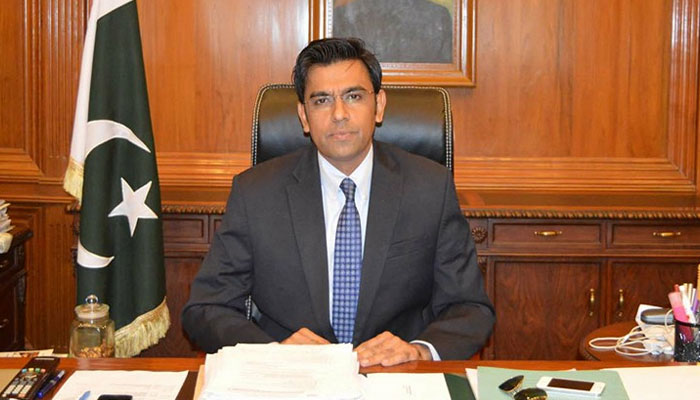Climate ministry official urges dedicated environmental police units for enhanced compliance
The federal and provincial environmental protection agencies (EPAs) should have their own police forces or dedicated enforcement units to ensure environmental compliance and implementation of the environmental regulations, a top official of the Federal Ministry of Climate Change and Environmental Coordination said on Friday.
“As compliance of environmental standards is not easy, EPAs should take steps for building the capacity of their staff and establish dedicated enforcement units or police forces to enforce their laws,” Asif Hyder Shah, federal secretary for climate change and environmental coordination, said at a dialogue on ‘Strengthening Environmental Compliance and Governance’ in Karachi.
The event, organized by the WWF-Pakistan under its project, International Labour and Environmental Standards Application in Pakistan’s SMEs (ILES), supported by the European Union (EU) in collaboration with the International Labor Organization (ILO), aimed to address challenges in environmental compliance.
Shah commended some textile and leather industries for their adherence to national and international environmental standards but urged others to follow suit. He stressed the importance of timely reporting multilateral environmental agreements (MEAs) and called for increased private sector involvement in environmental sustainability efforts.
Highlighting Pakistan’s vulnerability to climate change despite its minimal greenhouse gas emissions contribution, Shah emphasized the need for improved climate adaptation and resilience strategies.
Since the 18th amendment to Pakistan’s constitution in 2010, environmental governance became a provincial matter, resulting in the development of separate environmental protection agencies across provinces. To bridge knowledge gaps among EPAs, the WWF-Pakistan organised the dialogue, drawing representatives from federal and provincial EPAs, including Sindh, Punjab, Balochistan, Khyber Pakhtunkhwa (KPK), and Gilgit-Baltistan.
Speakers at the event emphasized the importance of strengthening inter-provincial and federal-provincial coordination to enhance compliance with multilateral environmental agreements and achieve Sustainable Development Goals (SDGs) through collaboration and capacity building.
Dr Masood Arshad, senior director programmes at WWF-Pakistan, underscored the essential role of environmental standards in Pakistan’s sustainable development, particularly in industries like textiles and leather, crucial for the country’s GDP.
Waqar Hussain Phulpoto, director technical at the Sindh Environmental Protection Agency (Sepa), praised WWF-Pakistan’s efforts for capacity building and technology transfer. However, he noted Sepa’s weak enforcement capacity due to the lack of its own law enforcement force. Sohail Ali Naqvi, director of Lead Sustainability and Stewardship at the WWF-Pakistan, highlighted the project’s engagement with textile and leather enterprises for environmental compliance and the drafting of cleaner policies for the Sindh province.
The dialogue concluded with an emphasis on the need for regular assessments and monitoring of the industrial sector, as well as continuous consultation and discussion on environmental compliance mechanisms. Participants included Samiullah Khan, director general of the Environmental Protection Agency, KPK; Arjmand Qayum Amjad, senior manager at the WWF-Pakistan; and Mehak Sikander, coordinator of the ILES project.
-
 King Offers Harry, Meghan Markle A 30 Bedroom Lodge Despite Its Decades Of Baggage: ‘it’s An Olive Branch’
King Offers Harry, Meghan Markle A 30 Bedroom Lodge Despite Its Decades Of Baggage: ‘it’s An Olive Branch’ -
 Selma Blair Talks About How Her Debilitating Disease Is 'misunderstood'
Selma Blair Talks About How Her Debilitating Disease Is 'misunderstood' -
 China’s 5-year Tech Strategy: What To Expect At Annual Parliament Meeting Amid Rivalry With West
China’s 5-year Tech Strategy: What To Expect At Annual Parliament Meeting Amid Rivalry With West -
 Andrew’s Total Meltdown On The Day Of Eviction: Insider Breaks It Down Word For Word
Andrew’s Total Meltdown On The Day Of Eviction: Insider Breaks It Down Word For Word -
 Michael J. Fox Stuns Actor Awards Audience With Rare Confession Amid Parkinson's Disease
Michael J. Fox Stuns Actor Awards Audience With Rare Confession Amid Parkinson's Disease -
 Beatrice’s In-laws Stand Against Her Marriage: ‘Furious Their Son Is Wrapped Up In Wreckage’
Beatrice’s In-laws Stand Against Her Marriage: ‘Furious Their Son Is Wrapped Up In Wreckage’ -
 Jessie Buckley Utters 'wild' Remarks For 'Hamnet' Co-star Emily Watson At Actor Awards
Jessie Buckley Utters 'wild' Remarks For 'Hamnet' Co-star Emily Watson At Actor Awards -
 Who Could Replace Ayatollah Ali Khamenei? Iran’s Top Successor Candidates Explained
Who Could Replace Ayatollah Ali Khamenei? Iran’s Top Successor Candidates Explained -
 Oliver 'Power' Grant Cause Of Death Revealed
Oliver 'Power' Grant Cause Of Death Revealed -
 Michael B. Jordan Makes Bombshell Confession At Actor Awards After BAFTA Controversy: 'Unbelievable'
Michael B. Jordan Makes Bombshell Confession At Actor Awards After BAFTA Controversy: 'Unbelievable' -
 Prince William Willing To Walk Road He ‘loathes’ For ‘horror Show’ Escape: ‘He’s Running Out Of Allies Fast’
Prince William Willing To Walk Road He ‘loathes’ For ‘horror Show’ Escape: ‘He’s Running Out Of Allies Fast’ -
 Pentagon Says No Evidence Iran Planned Attack On US, Undercutting Strike Justification
Pentagon Says No Evidence Iran Planned Attack On US, Undercutting Strike Justification -
 Prince William’s Changes Priorities With Harry After Kate Middleton’s Remission: ‘It Couldn't Be Worse’
Prince William’s Changes Priorities With Harry After Kate Middleton’s Remission: ‘It Couldn't Be Worse’ -
 Justin Bieber Gets Touching Tribute From Mom Pattie Mallette On Turning 32 Amid Limited-edition Birthday Drop
Justin Bieber Gets Touching Tribute From Mom Pattie Mallette On Turning 32 Amid Limited-edition Birthday Drop -
 Jada Pinkett Smith Details How Her Memoir Combats 'shame' Around Alopecia
Jada Pinkett Smith Details How Her Memoir Combats 'shame' Around Alopecia -
 Harrison Ford Reflects On Career As He Receives Life Achievement Award At 2026 Actor Awards
Harrison Ford Reflects On Career As He Receives Life Achievement Award At 2026 Actor Awards




